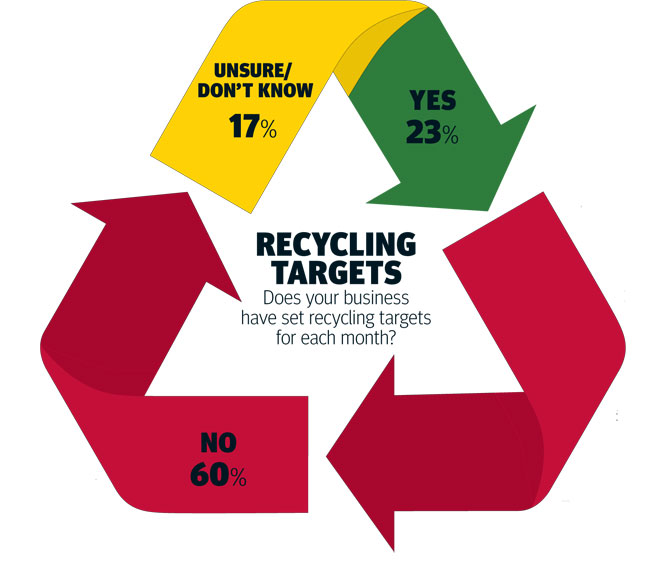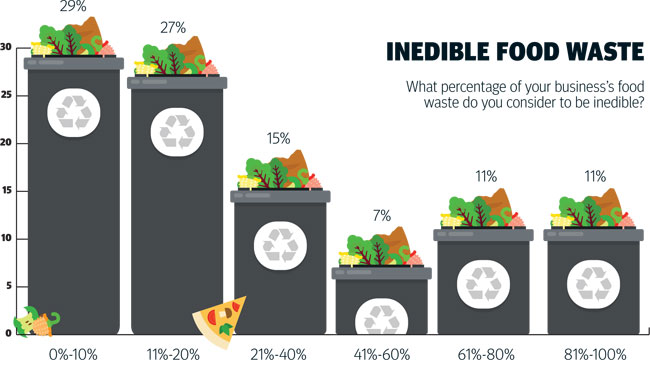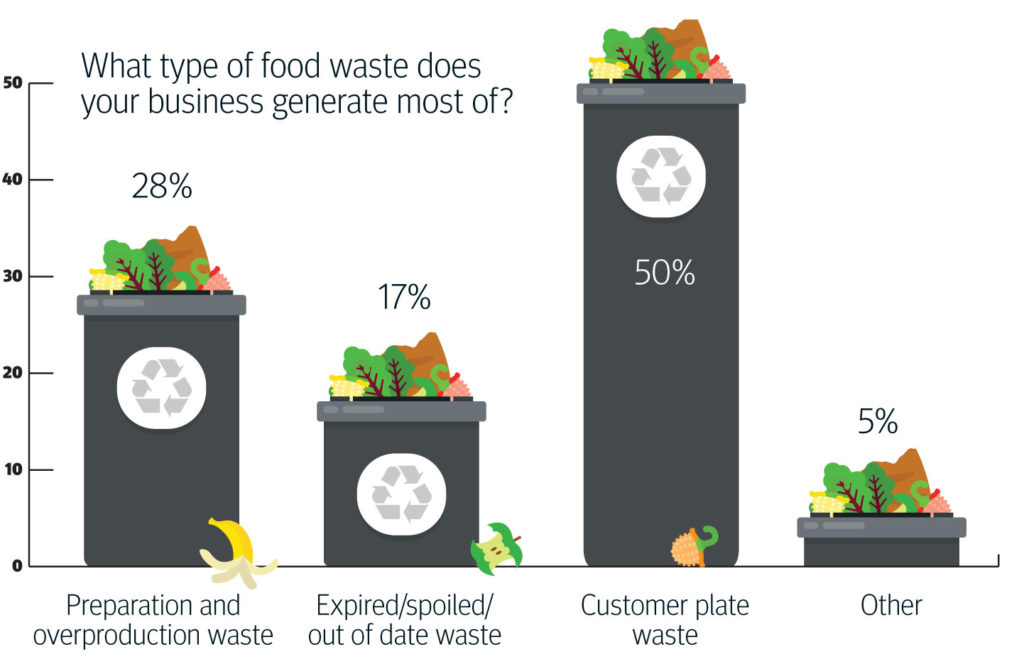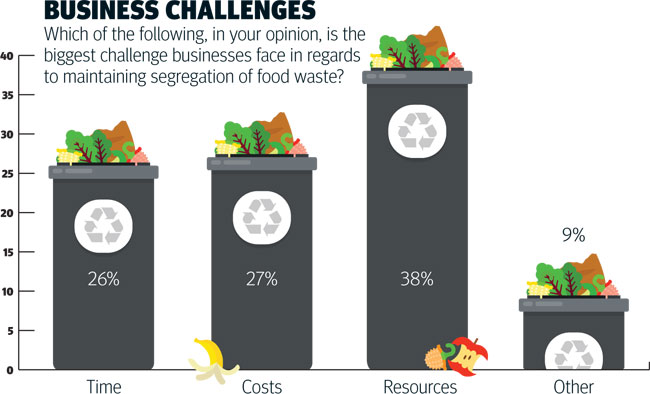Waste watchers: how do you monitor your leftover food?
Operators might recognise the importance of waste management, but many don't have the equipment or processes to deal with it, according to research by The Caterer in partnership with Biffa to mark Recycling Week. Elly Earls looks at how businesses bin their inedible food waste
New research has revealed that although the vast majority of hospitality operators think waste management is important, far fewer actually have processes in place to implement it, particularly when it comes to inedible food waste. This is despite the fact that simple, low- or even no-cost changes can result in a big boost to both a business's environmental credentials and its bottom line.
Some 83% of operators think waste management is very important or important, according to research carried out by The Caterer in conjunction with industry-leading waste management company Biffa. The survey of 594 operators also showed, however, that they're not dealing with it as effectively as they could. For example, while 75% of respondents say that inedible food waste comprises up to 40% of their total food waste, one third admit that they don't do anything to recycle it.
For Biffa's head of food retail, Russell Leach, unfortunately this finding didn't come as a huge surprise. "Inedible food waste in particular is often forgotten as there is very little focus on it in the media, despite it being such a huge percentage of waste that could be recycled and put to good use," he says.
"We should be putting all waste to better use, including inedible food waste. If it can't go to charity, we should certainly be finding alternative methods. Putting inedible food waste to good use won't only help the environment and your local community, it is also more cost-effective for businesses and will help to boost their recycling credentials," Leach adds. "General waste is more expensive to dispose of, so separating food waste will help to lower the costs of waste disposal and save businesses money."
Divide and conquer
Segregating food from other types of waste is the first step towards effective waste management, and while more than half of respondents do this, the survey also identified three key perceived barriers - resources, cost and time.
The good news is that the effective management of food waste doesn't have to be complex or require expensive equipment. "It isn't going to add to your workload, but simple actions can help to save your business money," says WRAP's programme area manager Eleanor Morris.
"The most important thing is to start tracking the food that is thrown away and this will highlight the savings that can be made."
For Leach, it shouldn't be any different for foodservice businesses than it is at home: "The key is to first understand what's going into your bins and what you can do to separate them in the most cost-effective way. Most people have multiple bins at home to separate their personal waste, and we believe it should be no different in the workplace."
Next, it's time to measure exactly where your food waste is coming from. As Andrew Stephen, chief executive of the Sustainable Restaurant Association (SRA) explains: "If you don't measure it, you don't know if you have a problem, what its scale is and at what point of the process it is most acute."
Ideally, operators should set up three bins, one for each of the key waste streams; prep, spoilage and plate. This will help businesses get a clear understanding of what stage of the process most of the waste is being generated.
"Over a three- or seven-day period, a clear picture will emerge of the biggest contributors," Stephen notes. "Armed with this data, operators can then start to take steps to tackle the biggest waste streams."
According to The Caterer and Biffa's research, half of food waste comes from customers' plates, just over a quarter from preparation and over-production, and 17% from expired, spoiled or out of date food.
Finally, you need to monitor it, and encouragingly, 70% of respondents already have processes in place to do this, 86% have a separate container for manual monitoring and 12% have smart meters, while the rest use other solutions including apps and wastage books.
The key, according to Morris, is getting your team involved in and aware of the process. "Setting a target is important, as you should have something to focus on, just as measuring is important in that you will know what food waste is costing you," she says. "By having a target, a business can monitor its progress andcreate a challenge for staff to contribute to and know they are creating a positive impact."
Save your waste, save your money
Many hospitality businesses have seen significant reductions in food waste and subsequent cash savings from implementing these three simple steps. The restaurant at the Bingham boutique hotel in Richmond, Surrey, which took part in the SRA's food reduction initiative FoodSave in 2015, managed to identify over £7,500 of savings simply from having the Food-Save team monitor their waste using the Winnow Waste Monitor System for four weeks. As a result, food waste weight reduced by 30%, representing an annualised reduction of 2.4 tonnes (or 6.5 tonnes including associated packaging).
It saved £109 in food waste costs per week, a saving of £7,581 annually, with the largest savings coming from reduced inventory waste, which represented 53% of saved weekly costs.
Key actions included increasing stocktakes and monitoring the fridges more closely to reduce spoilage. As a result of the weekly reports, the kitchen team also reduced their bread orders and started making bread in-house so they had tighter control on volumes.
But this was only the tip of the iceberg. "From our experience running FoodSave, we found that the average annual cost of food waste per business was £18,500," Stephen says. "And with rising food prices, that figure is likely to have risen since we completed the programme in 2015, when we worked with almost 100 businesses across London."
Businesses who participated in FoodSave made estimated annual savings of £6,000, which works out as a saving of 14p per cover. A number saved more than £20,000.
Incredible inedibles
Of course, it's unrealistic to think that all inedible food waste is avoidable; even the most resource-efficient businesses will have some food waste at the end of the day, whether that's meat trimmings, egg shells or unavoidable plate leftovers.
But it's here that we need to return to the survey results that Leach found most surprising: 75% of respondents say that inedible food waste comprises up to 40% of their total food waste, but one-third admit that they don't do anything to recycle it. On top of this, some 60% of operators surveyed don't have any monthly recycling targets. Yet sending food waste to anaerobic digestion plants such as Biffa's rather than to landfill can not only save businesses money, but also make a big environmental impact.
As Leach explains: "When inedible food waste is sent to anaerobic digestion, it can be turned into gas and electricity and can then be fed back into the national grid. For foods with no alternative, such as being used by a charity or reused, it's the best method of disposal. You will then be helping to power your local homes and businesses and this will have a hugely positive impact on your local community."
According to the Anaerobic Digestion and Bioresources Association, anaerobic digestion is already delivering over four times more electricity than solar photovoltaic systems in the UK. And while there are other options, such as using inedible food waste for animal feed, compost or, in some cases, combined heat and power, the on-site treatment of waste to generate power for the operator's own buildings, anaerobic digestion is by far the most cost-effective and straightforward method.
Moreover, environmental impact aside, the cash benefits of segregating food waste for recycling are indisputable, something only 56% of survey respondents were aware of.
According to Biffa, which operates a food collection service for hospitality businesses, it costs £30 per tonne to dispose of food waste, compared to the £120-£130 per tonne it costs to dispose of what's in a general waste bin.
"That's £100 per tonne of waste businesses could save simply by separating and disposing of waste correctly and responsibly," Leach stresses. "It's not only beneficial for your company, your environment, and your CSR stats, it's beneficial for your business's bank balance."
When it comes to setting recycling targets, the advice from Biffa is to start small, although ultimately, Leach sees no reason that the ultimate goal shouldn't be to recycle, re-use or recover absolutely all food waste.
"Can it be used to feed the homeless? Rehomed? Or given to a charity? If not, separate it and send it for anaerobic digestion. There's no reason why reaching a 100% recycling goal isn't achievable and realistic for all businesses," he concludes.
Doggy bags and staff meals: how Hawksmoor deals with its produce
At award-winning British steak and cocktail restaurant and bar chain Hawksmoor, food waste is addressed from every angle - from sending leftover meat home with patrons to ensuring inedible sinews make it to anaerobic digestion.
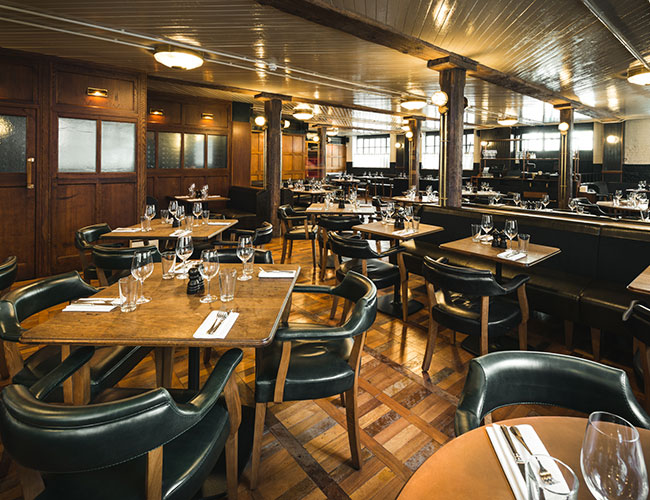
t starts in the kitchen. Not only are all orders heavily monitored, with every member of staff responsible for their own ordering, everything that is thrown away is recorded as wastage and there are daily and weekly checks.
Any cuts that have to be trimmed but are still usable are generally either used in another dish or repurposed as staff food. The same goes for everything from
day-old bread to pea shells.
Hawksmoor even removed steak tartare from the menu last year because new British regulations meant there was going to be too much wastage. "It upset
a lot of people, but it felt wrong to throw away so much food to meet a regulation," says creative co-ordinator and head of sustainability Emmy van Beek, adding that if there are leftovers on a plate, customers are always encouraged to take them home and, in the main, they do.
As committed as Hawskmoor is to reducing food waste, it is by no means a zero-waste business. "We're not going to force-feed our staff the tough green outer leaves from a cabbage!" van Beek grins.
Anything inedible that remains goes, if possible, to anaerobic digestion, although with some sites, particularly in central London, the team is limited by which waste contractors they can work with. "The majority of our waste goes to anaerobic digestion plants - we believe it's the easiest way to dispose of food and turn it into energy," van Beek concludes.
Biffa is a leading UK integrated waste management company providing collection, recycling, treatment, disposal and technologically-driven energy generation services for over 72,000 customers nationwide, ranging from small local businesses with a single bin to large businesses requiring complex solutions.
Biffa controls a significant proportion of waste arising in the UK, covering a vast range of business sectors, including manufacturing, retail and hospitality. Its 78 collection depots and transfer stations across the UK handle general waste, glass, dry mixed recyclables, food waste and other segregated recyclables.
Biffa is focused on delivering an excellent customer experience, as well as serving to protect the environment, our people and the public.



